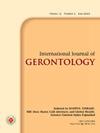Health-Related Quality of Life among Elderly Individuals with Both Diabetes and Disabilities in Korea: Results from a Nationally Representative Survey
IF 0.3
4区 医学
Q4 GERIATRICS & GERONTOLOGY
引用次数: 2
Abstract
Background: Disability is an important factor to consider when providing care aimed at improving health-related quality of life (HRQoL) in elderly individuals with diabetes. However, few studies have explored the influence of disability on HRQoL in this group. This study aimed to compare HRQoL among elderly individuals with and without disabilities who were diagnosed with diabetes, and to identify factors related to HRQoL. Method: A sample of 927 participants with diabetes aged from 65 to 98 was obtained from the Korean Health Panel in 2017 (195 were disabled). Differences in HRQoL were assessed among independent samples between participants with disabilities and those without disabilities using t-tests and Chi-square tests. Hierarchical multiple regression analysis determined factors related to HRQoL among participants with disabilities. Results: All dimensions of HRQoL in participants with disabilities were significantly poorer than in those without disabilities. Lower levels of instrumental activities of daily living (β = -0.509, p < 0.001), hypertension (β = -0.152, p = 0.008), arthritis (β = -0.133, p = 0.019), high stress (β = -0.193, p < 0.001), and higher levels of physical activity (β = 0.156, p = 0.006) were significantly associated with HRQoL in elderly participants with both diabetes and disabilities. Conclusion: Elderly individuals with diabetes and disabilities are more likely to have poorer HRQoL than those without disabilities. The results demonstrate HRQoL are associated with lower levels of instrumental activities of daily living, hypertension, arthritis, high stress, and higher levels of physical activity.韩国老年糖尿病和残疾患者的健康相关生活质量:一项具有全国代表性的调查结果
背景:残疾是提供旨在改善老年糖尿病患者健康相关生活质量(HRQoL)的护理时需要考虑的一个重要因素。然而,很少有研究探讨残疾对这一群体HRQoL的影响。本研究旨在比较诊断为糖尿病的有残疾和无残疾老年人的HRQoL,并确定与HRQoL相关的因素。方法:2017年从韩国健康小组获得927名年龄在65至98岁之间的糖尿病患者样本(其中195名为残疾)。使用t检验和卡方检验评估独立样本中残疾和非残疾参与者HRQoL的差异。分层多元回归分析确定了残疾参与者HRQoL的相关因素。结果:残疾被试的HRQoL各维度均显著低于无残疾被试。较低水平的日常生活工具活动(β = -0.509, p < 0.001)、高血压(β = -0.152, p = 0.008)、关节炎(β = -0.133, p = 0.019)、高压力(β = -0.193, p < 0.001)和较高水平的身体活动(β = 0.156, p = 0.006)与老年糖尿病和残疾参与者的HRQoL显著相关。结论:老年糖尿病伴残疾患者的HRQoL较无残疾患者差。结果表明,HRQoL与日常生活工具活动水平较低、高血压、关节炎、高压力和高水平的身体活动有关。
本文章由计算机程序翻译,如有差异,请以英文原文为准。
求助全文
约1分钟内获得全文
求助全文
来源期刊
CiteScore
0.60
自引率
0.00%
发文量
0
审稿时长
6-12 weeks
期刊介绍:
The Journal aims to publish original research and review papers on all fields of geriatrics and gerontology, including those dealing with critical care and emergency medicine.
The IJGE aims to explore and clarify the medical science and philosophy in all fields of geriatrics and gerontology, including those in the emergency and critical care medicine. The IJGE is determined not only to be a professional journal in gerontology, but also a leading source of information for the developing field of geriatric emergency and critical care medicine. It is a pioneer in Asia.
Topics in the IJGE cover the advancement of diagnosis and management in urgent, serious and chronic intractable diseases in later life, preventive medicine, long-term care of disability, ethical issues in the diseased elderly and biochemistry, cell biology, endocrinology, molecular biology, pharmacology, physiology and protein chemistry involving diseases associated with age. We did not limit the territory to only critical or emergency condition inasmuch as chronic diseases are frequently brought about by inappropriate management of acute problems.

 求助内容:
求助内容: 应助结果提醒方式:
应助结果提醒方式:


